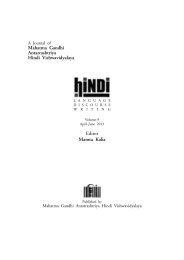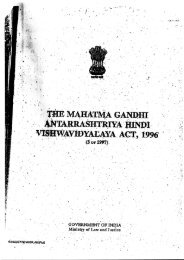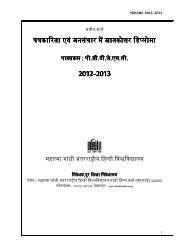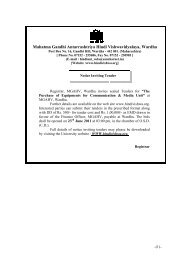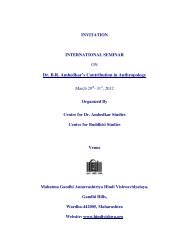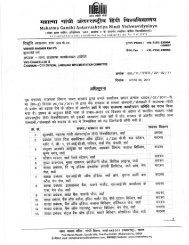A Journal of Mahatma Gandhi Antarrashtriya Hindi Vishwavidyalaya
A Journal of Mahatma Gandhi Antarrashtriya Hindi Vishwavidyalaya
A Journal of Mahatma Gandhi Antarrashtriya Hindi Vishwavidyalaya
You also want an ePaper? Increase the reach of your titles
YUMPU automatically turns print PDFs into web optimized ePapers that Google loves.
<strong>of</strong> hatred towards the old and terminally<br />
ill Selma, but Selma is full <strong>of</strong> love for<br />
Yoke and wants from the core <strong>of</strong> her<br />
heart to remove the fear <strong>of</strong> death from<br />
Yoke’s mind: “How one could live with<br />
absolute outside fear?’’ In addition, Yoke<br />
imagines arrival <strong>of</strong> the ‘satan’ in lieu <strong>of</strong><br />
Saint Nicholas while Selma, forgetting the<br />
nearing death, awakes and sings to celebrate<br />
Christmas but becomes sad when her cry<br />
during singing is recognized. Interestingly,<br />
Selma asks Yoke as to why the latter always<br />
concentrates on death. When Selma sings<br />
at the time <strong>of</strong> birth <strong>of</strong> the god-child, Yoke<br />
feels appearance <strong>of</strong> death. Undoubtedly<br />
this is a symptom <strong>of</strong> existential psychology.<br />
Selma’s following words are quite<br />
perceptive. ‘‘You think yourself free, that<br />
is the root <strong>of</strong> all difficulties. Neither we<br />
are alone, nor free. Rather we are not<br />
alone and can’t be alone, so are not free...<br />
and therefore the right to choose or decide<br />
is not ours...Imaginations <strong>of</strong> all such<br />
freedoms are mere ego...’’ These are<br />
existential issues. One day Selma expresses<br />
her desire to marry Yan and executes<br />
a will for all her property in his name.<br />
To Selma, other’s presence itself is like<br />
God’s presence. Finally, Yoke accepts her<br />
defeat and wants to commit suicide by<br />
addressing this world as bastard. Thus<br />
there are two perspectives about death—<br />
are these two perspectives Indian and<br />
European in essence? Chandrakant<br />
Bandivadekar considers such categorization<br />
as simplification. However, there is no<br />
doubt that this novel is existential<br />
individualistic and more artistic than real.<br />
Thus in these three novels Agyeya<br />
has opposed Marxist classist view <strong>of</strong> reality.<br />
Though he averred that a writer may get<br />
inspiration from even small things or events<br />
but in practice he made the range and<br />
depth <strong>of</strong> lives <strong>of</strong> elites as the final theme<br />
<strong>of</strong> his writings. He did not see the labour<br />
class as revolutionary, hence his<br />
perspective to social reality differs from<br />
that <strong>of</strong> Marx and <strong>Gandhi</strong> who provided<br />
a central place to the common man. All<br />
these novels have preference for individual<br />
characters to social system. That is, there<br />
is less sociality in these novels, though<br />
these are full <strong>of</strong> artistry, poetics and<br />
literariness. On the other hand, in Nagarjun’s<br />
novels, especially in ‘Balchanma’, there<br />
is more sociality than artistry, poetics<br />
and literariness and as such he is more<br />
realistic than Agyeya. The famous<br />
sociologist C. Wright Mills talks <strong>of</strong><br />
‘sociological imagination’ with three aspects<br />
<strong>of</strong> life : biography, history and society—<br />
and these have dialectical and dynamic<br />
relationship with one another. But<br />
unfortunately in these novels <strong>of</strong> Agyeya<br />
there is only expressive biography; actually<br />
history and society are missing. At the<br />
most there is a concern for inter-personal<br />
relationships among some characters but<br />
society is much more than the sum total<br />
<strong>of</strong> individuals. The process <strong>of</strong> socialisation<br />
starts in the family since one’s birth and<br />
ends only with the death through various<br />
norms and values. That is why C. Wright<br />
Mills rightly observes that ‘private troubles’<br />
<strong>of</strong> individuals are not <strong>of</strong> much concern,<br />
rather only when private troubles become<br />
‘public issues’, these are the real collective<br />
concerns <strong>of</strong> the society, hence more<br />
60 :: January-March 2012



